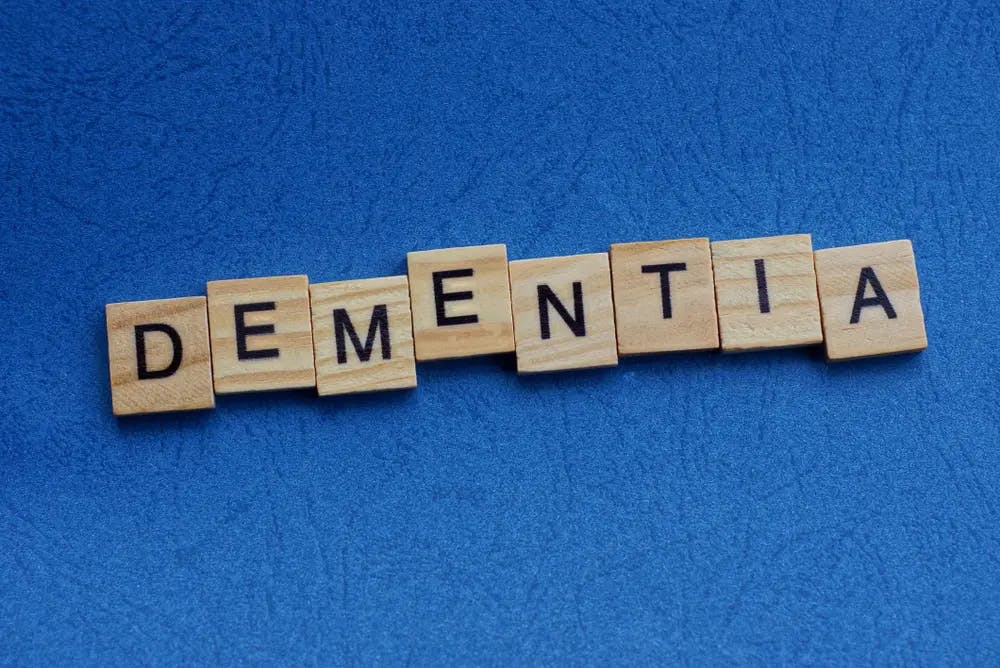The Different Types of Dementia Explained

Estimated Reading Time: 5 minutes
Dementia is an umbrella term for cognitive conditions that cause your brain to decline over time. There are several types of dementia, and we’ve discussed the most common types in this article, including what they are, how they’ll affect your loved one and how common they are.
Need to find dementia care fast?
Browse the best dementia care homes for your loved one.
The Most Common Types of Dementia
We’ve listed the four most common types of dementia below. According to the National Institute for Health and Care Excellence, these four types of dementia comprise between 80% and 95% of total cases. The NHS say that around 944,000 in the UK have dementia, so this would be between 755,200 and 896,800 people with one of these four types of dementia.
Alzheimer’s disease
Alzheimer’s disease is the most common type of dementia. Alzheimer’s disease primarily affects the hippocampus, which is the part of the brain in charge of memory.
Alzheimer’s disease symptoms
- Reduced memory and thinking skills over time
- Finding it more difficult to carry out basic cleaning and cooking
- Limited mobility
How common is Alzheimer’s disease?
Alzheimer’s disease is the most common type of dementia. This affects one in fourteen people over 65 and one in six people over 80.
NICE say that 50-75% of dementia cases are Alzheimer’s disease. It’s difficult to know the exact percentage as Alzheimer’s disease can co-exist with other forms of dementia (such as vascular dementia).
So, an estimated 472,000 to 708,000 people in the UK have Alzheimer’s disease.
We’re here to help you find the right dementia care home for you or your loved one. You can request a free list of dementia care homes from our care experts, who will then share homes matching your budget and location. You can also search for a dementia care home through our easy-to-use directory.
Vascular dementia
This type of dementia is caused by reduced blood flow to the brain. This reduced blood flow occurs when the arteries are blocked or have narrowed, so brain cells are deprived of oxygen and begin to die.
Vascular dementia can take a few different forms, with your loved one’s exact dementia diagnosis depending on why blood flow has been reduced.
Subcortical vascular dementia makes it difficult for people to process information and express emotions. It can also cause incontinence and make it more challenging to pronounce certain words. The other two main types of vascular dementia are stroke-related vascular dementia and multi-infarct vascular dementia.
Vascular dementia can gradually take place, or it can suddenly start with heightened symptoms.
Vascular dementia symptoms
- Finding it difficult to concentrate or comprehend things
- Disorientation
- Confusion
- Sudden changes to mood or personality
- A loss of mobility (you may find it more challenging to walk in a straight line or remain balanced)
How common is vascular dementia?
Vascular dementia is the second most common type of dementia. NICE say that it comprises up to 20% of cases, which means that around 188,000 people in the UK are living with a form of vascular dementia.
Lewy Body dementia
The name of this type of dementia comes from ‘lewy bodies’, which are abnormal collections of proteins that build up inside the brain cells.
When this build-up happens, chemicals in the brain are affected, making it more challenging for affected people to think clearly. Movement may also become limited, and sudden swings in behaviour and mood can become common. Behavioural changes can occur hour-to-hour or even minute-to-minute, with somebody being lucid and aware one minute but not the next.
Lewy Body dementia symptoms
The symptoms of Lewy Body dementia depend on which parts of the brain have experienced the biggest build-ups of the faulty protein. If it’s in the base of the brain, your loved one will become less mobile. If it’s in the cerebral cortex, they’ll have difficulty with remembering things, thinking clearly, learning new things, problem-solving and emotional intelligence.
How common is Lewy Body dementia?
NICE say that Lewy Body dementia comprises around 10-15% of cases, which means that approximately 94,400 to 141,600 people in the UK have this type of dementia.
Frontotemporal dementia
This type of dementia causes difficulties with behaviour and language. An increased production of different proteins leads to frontotemporal dementia. The build-up of these proteins causes cells to die and the brain to shrink.
Frontotemporal dementia tends to begin at a younger age. People are often diagnosed at 45 to 65 years old, while the usual diagnosis age for other forms of dementia is over 65.
Frontotemporal dementia symptoms
- More unpredictable behaviour and sudden mood swings
- Finding it more difficult to communicate through spoken word, speaking slowly, getting words in the wrong order and misunderstanding things
- Becoming easily distracted or finding it tougher to plan or organise
How common is frontotemporal dementia?
NICE say that frontotemporal dementia comprises around 2% of cases, which means that roughly 18,880 people in the UK have this form of dementia.
The Dementia Care We Offer
We’re partnered with the UK’s best home care providers, many of which offer specialist dementia care. Through our website, you can find Alzheimer’s disease, early-stage and late-stage dementia care at home.
We also list dementia care homes throughout the UK. These homes provide round-the-clock support given by professional dementia carers for people living with a type of dementia, including those listed in this article.
Lottie matches care seekers with the best dementia care homes for their needs. You can also request a free dementia care home shortlist from our care experts, who will share homes matching your budget and location.
Frequently Asked Questions
What type of dementia progresses the fastest?
Creutzfeldt-Jakob disease is a rare form of dementia - around 1 in 1 million people get it - that progresses faster than more common types of dementia, such as Alzheimer’s disease or vascular dementia.
Creutzfeldt-Jakob disease destroys brain cells, causing a quick decline in reasoning, thinking and awareness.
What’s the difference between Alzheimer’s disease and vascular dementia?
Alzheimer’s disease occurs through plaques and tangles that form in the brain, while vascular dementia occurs due to reduced blood flow, causing brain cells to be deprived of oxygen.
These two types of dementia have some similarities, however. They both affect thinking, behaviour and the ability to perform everyday tasks.



